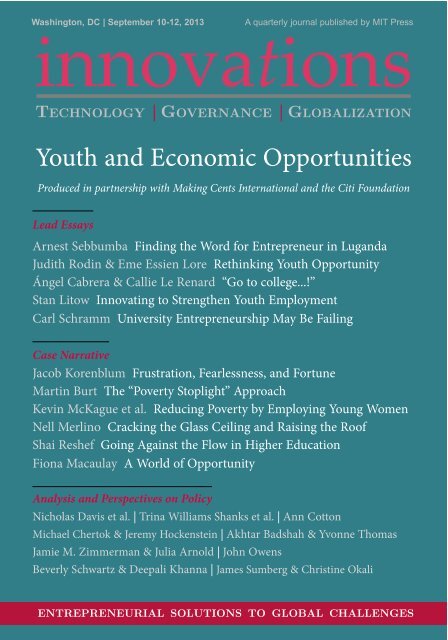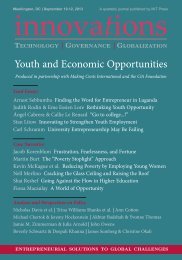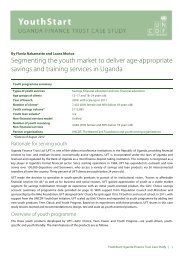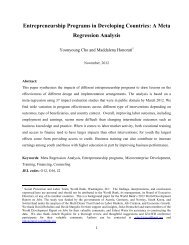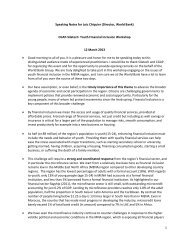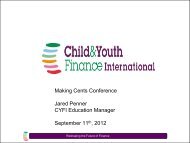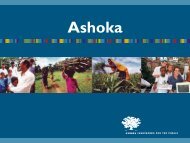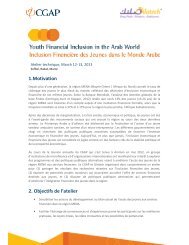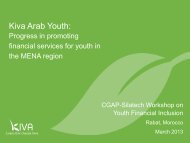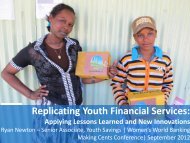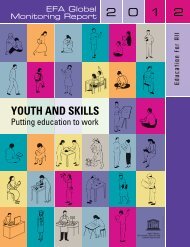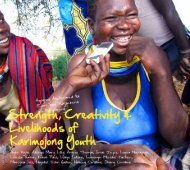Download - Youth Economic Opportunities
Download - Youth Economic Opportunities
Download - Youth Economic Opportunities
You also want an ePaper? Increase the reach of your titles
YUMPU automatically turns print PDFs into web optimized ePapers that Google loves.
Washington, DC | September 10-12, 2013 A quarterly journal published by MIT Press<br />
innovations<br />
TECHNOLOGY | GOVERNANCE | GLOBALIZATION<br />
<strong>Youth</strong> and <strong>Economic</strong> <strong>Opportunities</strong><br />
Produced in partnership with Making Cents International and the Citi Foundation<br />
Lead Essays<br />
Arnest Sebbumba Finding the Word for Entrepreneur in Luganda<br />
Judith Rodin & Eme Essien Lore Rethinking <strong>Youth</strong> Opportunity<br />
Ángel Cabrera & Callie Le Renard “Go to college...!”<br />
Stan Litow Innovating to Strengthen <strong>Youth</strong> Employment<br />
Carl Schramm University Entrepreneurship May Be Failing<br />
Case Narrative<br />
Jacob Korenblum Frustration, Fearlessness, and Fortune<br />
Martin Burt The “Poverty Stoplight” Approach<br />
Kevin McKague et al. Reducing Poverty by Employing Young Women<br />
Nell Merlino Cracking the Glass Ceiling and Raising the Roof<br />
Shai Reshef Going Against the Flow in Higher Education<br />
Fiona Macaulay A World of Opportunity<br />
Analysis and Perspectives on Policy<br />
Nicholas Davis et al. | Trina Williams Shanks et al. | Ann Cotton<br />
Michael Chertok & Jeremy Hockenstein | Akhtar Badshah & Yvonne Thomas<br />
Jamie M. Zimmerman & Julia Arnold | John Owens<br />
Beverly Schwartz & Deepali Khanna | James Sumberg & Christine Okali<br />
ENTREPRENEURIAL SOLUTIONS TO GLOBAL CHALLENGES
innovations<br />
TECHNOLOGY | GOVERNANCE | GLOBALIZATION<br />
Introductory Essays<br />
5 Guest Editor’s Introduction<br />
Making Cents International and Citi Foundation<br />
7 Investing in the <strong>Economic</strong> Progress of <strong>Youth</strong><br />
Jasmine Thomas<br />
Lead Essays<br />
13 Finding the Word for Entrepreneur in Luganda<br />
Arnest Sebbumba<br />
19 <strong>Youth</strong> Opportunity: Rethinking the Next Generation<br />
Judith Rodin and Eme Essien Lore<br />
27 “Go to college, young men and women, go to college!”<br />
Ángel Cabrera and Callie Le Renard<br />
35 Innovating to Strengthen <strong>Youth</strong> Employment<br />
Stanley Litow<br />
43 University Entrepreneurship May Be Failing Its Market Test<br />
Carl Schramm<br />
Case Narratives<br />
49 Frustration, Fearlessness, and Fortune: How <strong>Youth</strong>-Led Startups<br />
Are Redefining Entrepreneurship<br />
Jacob Korenblum<br />
Fundación Paraguaya<br />
55 The “Poverty Stoplight” Approach to Eliminating<br />
Multidimensional Poverty: Business, Civil Society, and<br />
Government Working Together in Paraguay<br />
Martin Burt<br />
Special Issue for the 2013 Global <strong>Youth</strong> <strong>Economic</strong> <strong>Opportunities</strong> Conference
Hathay Bunano<br />
77 Reducing Poverty by Employing Young Women: Hathay<br />
Bunano’s Scalable Model for Rural<br />
Production in Bangladesh<br />
Kevin McKague, Samantha Morshed,<br />
and Habibur Rahman<br />
Count Me In for Women’s <strong>Economic</strong> Independence<br />
97 Cracking the Glass Ceiling and Raising the Roof<br />
Nell Merlino<br />
University of the People<br />
109 Going Against the Flow in Higher Education:<br />
Deliberately Including those Previously Excluded<br />
Shai Reshef<br />
Making Cents International<br />
125 Toward a World of Opportunity<br />
Fiona Macaulay<br />
Analysis<br />
149 TEN <strong>Youth</strong>: Unlocking Enterprise Growth by Focusing on<br />
the Fortune at the Bottom of the Talent Pyramid<br />
Nicholas Davis, Ebba Hansmeyer, Branka Minic,<br />
Shantanu Prakash, and Subramanian Rangan<br />
167 Financial Education and Financial Access: Lessons<br />
Learned from Child Development Account Research<br />
Trina R. Williams Shanks, Lewis Mandell,<br />
and Deborah Adams<br />
Perspectives on Policy<br />
185 Sourcing Change: Digital Work Building Bridges<br />
to Professional Life<br />
Michael Chertok and Jeremy Hockenstein<br />
197 <strong>Youth</strong>Spark and the Evolution of a Corporate<br />
Philanthropy Program<br />
Akhtar Badshah and Yvonne Thomas<br />
211 It’s All About the Jobs<br />
Jamie McAuliffe, Jasmine Nahhas di Florio,<br />
and Pia Saunders
227 Who Teaches Us Most About Financial Programing<br />
in Africa<br />
Ann Cotton<br />
241 Hope or Hype Five Obstacles to Mobile Money<br />
Innovations for <strong>Youth</strong> Financial Services<br />
Jamie M. Zimmerman and Julia Arnold<br />
255 Future Forward: Innovations for <strong>Youth</strong> Employment<br />
in Africa<br />
Beverly Schwartz and Deepali Khanna<br />
267 Young People, Agriculture, and Transformation in<br />
Rural Africa: An “Opportunity Space” Approach<br />
James Sumberg and Christine Okali<br />
279 Offering Digital Financial Services to Promote Financial<br />
Inclusion: Lessons We’ve Learned<br />
John Owens<br />
About Innovations<br />
Innovations is about entrepreneurial solutions to global challenges.<br />
The journal features cases authored by exceptional innovators; commentary and<br />
research from leading academics; and essays from globally recognized executives and<br />
political leaders. The journal is jointly hosted at George Mason University's School of<br />
Public Policy, Harvard's Kennedy School of Government, and MIT's Legatum Center<br />
for Development and Entrepreneurship. Topics of interest include entrepreneurship<br />
and global development, the revolution in mobile communications, global public<br />
health, water and sanitation, and energy and climate.<br />
Authors published in Innovations to date include three former and one current head of<br />
state (including U.S. Presidents Carter and Clinton); a Nobel Laureate in <strong>Economic</strong>s;<br />
founders and executive directors of some of the world’s leading companies, venture<br />
capital firms, and foundations; and MacArthur Fellows, Skoll awardees, and Ashoka<br />
Fellows. Recently the journal has published special editions in collaboration with the<br />
Clinton Global Initiative, the World <strong>Economic</strong> Forum, the Rockefeller Foundation,<br />
Ashoka, the Lemelson Foundation, and Social Capital Markets.<br />
Subscribe at<br />
http://www.mitpressjournals.org/innovations
Making Cents International and<br />
Citi Foundation<br />
Introduction to the Special Issue<br />
This youth-focused double issue is the product of a shared passion to improve<br />
livelihoods and economic opportunities among the world’s 1.8 billion youth. The<br />
publication is particularly timely given the increased focus being given to programming,<br />
funding, and research on the contributions of young people in a time<br />
of economic volatility. As the economy shows signs of recovery, the International<br />
Labor Organization reports that the global rate of youth unemployment hovers<br />
around 13%, just below the jobless rate at the peak of the crisis—this still represents<br />
an estimated 73 million young people. Despite staggering unemployment,<br />
our concern is not the scale of the problem. Instead, we are encouraged by the scale<br />
of the opportunity before us.<br />
With the support and collaboration of the Citi Foundation, Making Cents<br />
International will leverage this Innovations issue as well as the annual conference,<br />
funder meetings, “Apply It!” webinars, blogs, crowd-sourced solution events, and<br />
other tools to engage a global network of partners to galvanize dialog, collaboration,<br />
and knowledge-building toward a collective global agenda for youth.<br />
Through its Collaborative Learning and Action Institute (Co-Lab), Making Cents<br />
will promote and improve economic opportunities for youth around the world.<br />
This year, the Co-Lab aims to strengthen knowledge management in the field,<br />
enhancing the scope and depth, diversity, and quality of how and what our people<br />
learn. Co-Lab gives our stakeholders and partners a new platform to both add<br />
value and benefit from knowledge management that translates ideas into solutions.<br />
The following collection of analyses, research, and remarkable stories is a part<br />
of our new vision. In searching for authors, we weren’t searching for all the<br />
answers. We looked across diverse sectors for authors who could connect disparate<br />
concepts, innovations, theories, stories, or research results that move the youth<br />
economic opportunities agenda forward.<br />
To highlight a few authors, first and foremost, we hear the voices of young people<br />
describing the hard work, ambition, fortitude, and support needed from others<br />
to bring innovations to old problems. Arnest Sebbumba, a young farmer, takes us<br />
into rural Africa and reveals the choices, challenges and opportunities facing agricultural<br />
entrepreneurs in Uganda. Social entrepreneur and Founder of Souktel,<br />
Jacob Korenblum, shares the thrills and spills of navigating entrepreneurship and<br />
identifying new opportunities in conflict-environments.<br />
© 2013 Making Cents International and Citi Foundation<br />
innovations / 2013 Global <strong>Youth</strong> <strong>Economic</strong> <strong>Opportunities</strong> Conference 5
Featuring best practices and innovations in youth employment, Jamie<br />
McAuliffe’s case study of Employment for Education demonstrates how the NGO<br />
created a youth jobs model that reverses conventional supply-driven education<br />
processes that often widens unemployment. Meanwhile, Michael Chertok and<br />
Jeremy Hockenstein, of Digital Divide Data, highlight a growing $300 billion business<br />
process outsourcing industry, and the economic potential of Impact Sourcing<br />
as a “game-changer” for scaling<br />
skilled jobs among youth.<br />
Innovations aimed at increasing<br />
financial education, access, and inclusion<br />
among young people is critical.<br />
Research from Jamie Zimmerman<br />
and Julia Arnold of the New America<br />
Foundation chronicles various models<br />
that incorporate mobile technology<br />
into youth financial services programs,<br />
illustrating both the promise<br />
and, notably, high-cost and regulatory<br />
barriers to implementation.<br />
Underscoring the critical role of<br />
the private sector, Branka Minic, Nicholas Davis, and Ebba Hansmeyer and their<br />
team approach youth capacity from the perspective of developing talent within the<br />
corporate workforce. Their model enables businesses to find and develop talent to<br />
fuel growth, productivity, efficiency, and innovation while providing young people<br />
with the skills and knowledge they need to more easily secure employment.<br />
Simultaneously, Akhtar Badshah and Yvonne Thomas of Microsoft, reflect upon<br />
the company’s core philanthropic philosophy—providing information and communications<br />
technology (ICT) training that empowers individuals with highdemand<br />
skills.<br />
We extend our sincere thanks and appreciation to the authors who invested<br />
their time, energy, and expertise to produce this special issue, which both embodies<br />
and inspires a guiding theme of collaboration. And, in that spirit, we ask readers<br />
to consider how they might apply these lessons and innovations to their own<br />
work, and share their results with us. Many of these authors will be featured in<br />
“Apply It” learning events throughout the coming year at<br />
www.<strong>Youth</strong><strong>Economic</strong><strong>Opportunities</strong>.org. We look forward to your participation.<br />
Making Cents International<br />
Making Cents International and Citi Foundation<br />
This youth-focused double<br />
issue is the product of a<br />
shared passion to improve<br />
livelihoods and economic<br />
opportunities among the<br />
world’s 1.8 billion youth.<br />
Citi Foundation<br />
6 innovations / <strong>Youth</strong> and <strong>Economic</strong> <strong>Opportunities</strong>
Shai Reshef<br />
Going Against the Flow<br />
in Higher Education<br />
Deliberately Including those Previously Excluded<br />
Innovations Case Narrative:<br />
University of the People<br />
If everyone actually had the opportunity to obtain a university education, the<br />
world would be a different place.<br />
I believe this so strongly that, though I could have retired in 2009, I chose<br />
instead to found University of the People (UoPeople): the world’s tuition-free, nonprofit,<br />
online, degree-granting academic institution dedicated to opening access to<br />
higher education globally. UoPeople is specifically designed to provide access to<br />
college studies for qualified high school graduates, despite financial, geographic,<br />
societal, or personal constraints.<br />
We are proud to say that our institution has eliminated almost the entire cost<br />
of higher education. Three key innovations allow us to function effectively on a<br />
limited budget without sacrificing the quality of education: we embrace collaborative<br />
learning, we use Open Educational Resources and open source technology,<br />
and we get excellent assistance from approximately 3,000 registered volunteers. By<br />
opening the gates of higher education to a globalized student body while limiting<br />
operating costs, we are building a scalable model that can be duplicated by governments<br />
and universities to show that delivering quality education to masses of people<br />
need not be expensive. This model is especially relevant for governments in<br />
developing countries that want to reach citizens who would otherwise be left uneducated.<br />
Instead of building a traditional brick-and-mortar institution, an elite<br />
equivalent to Harvard, developing country governments can turn to quality online<br />
education based on resources like ours and thus serve thousands of individuals,<br />
offering the courses, especially in computer science and business administration,<br />
which will help them find good jobs.<br />
UoPeople’s financial model is simple. While our institution is tuition-free, we<br />
do ask students to make modest financial contributions to their education. In our<br />
tuition-free model, we do not charge for the cost of instruction, books, teachers, or<br />
Shai Reshef is the founder and President of University of the People (UoPeople).<br />
© 2013 Shai Reshef<br />
innovations / 2013 Global <strong>Youth</strong> <strong>Economic</strong> <strong>Opportunities</strong> Conference 109
Shai Reshef<br />
According to UNESCO,<br />
given the growth of youth<br />
populations worldwide, by<br />
2025, an estimated 98<br />
million youth will be hoping<br />
for places in universities that<br />
simply do not exist.<br />
annual enrolment. All we ask of our students is that they cover the cost of processing<br />
their applications ($50) and examinations ($100 per end-of-course exam).<br />
There are no other costs whatsoever. For those who cannot afford even these nominal<br />
fees, UoPeople offers scholarships such as the Hewlett-Packard Women<br />
Scholarship Fund, the Intel Haitian Women Scholarship Fund, and the Micro-<br />
Scholarship Portal, the first of its<br />
kind at any university, which facilitates<br />
micro-donations from the<br />
public. 1 We offer all of these scholarships<br />
to remain consistent with<br />
our mission and ensure that no<br />
qualified student is excluded for<br />
financial reasons. Our mission is to<br />
offer higher education to all, and to<br />
ensure that all qualified students<br />
have the opportunity to study<br />
towards an academic degree, whatever<br />
their financial situation.<br />
Since we launched in 2009,<br />
UoPeople has partnered with Yale<br />
University to conduct research, New York University to accept our students for further<br />
study, and Hewlett-Packard, as part of its Catalyst Initiative, for internships.<br />
To date, we have admitted more than 1,500 students from 136 countries around the<br />
world; many had no other alternative. The University has gained the support of<br />
leading academics; among them are New York University President John Sexton,<br />
Academy of Paris Rector Emeritus Mrs. Michèle Gendreau-Massaloux, Indian<br />
Institute of Technology (ITT) Bombay Director Devang Khakhar, Oxford Vice-<br />
Chancellor Sir Colin Lucas, Rhode Island School of Design President Emeritus<br />
Roger Mandle, Barnard College President Emeritus Judith R. Shapiro, and George<br />
Washington President Emeritus Stephen Joel Trachtenberg. They all serve on our<br />
President’s Council. UoPeople has amassed over 1,250,000 followers on Facebook<br />
and garnered media coverage throughout the world. Student satisfaction is high.<br />
Each term, we ask students if they would recommend UoPeople to a peer—and<br />
95% say yes.<br />
Thus, we have created a viable solution to the pervasive problem of access to<br />
education.<br />
The problem of educational access knows no country borders and is found in<br />
every region on earth as financial, geographic, placement, social, and personal<br />
constraints are widespread and youth populations grow. According to UNESCO,<br />
given the growth of youth populations worldwide, by 2025, an estimated 98 million<br />
youth will be hoping for places in universities that simply do not exist. 2<br />
This narrative informs the successful launch and implementation of a solution<br />
to a pressing world crisis. Not only has it changed 1,500 lives in four short years,<br />
and built the infrastructure needed to serve masses of students with quality degree<br />
110 innovations / <strong>Youth</strong> and <strong>Economic</strong> <strong>Opportunities</strong>
Going Against the Flow in Higher Education<br />
programs; critically, it also serves as a model for governments, communities, and<br />
universities throughout the world. At this moment in history, having completed its<br />
technological development and demonstrated the quality of its courses, it is entering<br />
the next phase, and preparing to scale up rapidly.<br />
THE ORIGIN OF UOPEOPLE<br />
My personal journey from for-profit to retirement to non-profit developed during<br />
the 20 years I worked in for-profit education. I was responsible for educational programs<br />
for hundreds of thousands of students from kindergarten to university level.<br />
Among other efforts, in 2000 I started the first online university outside the United<br />
States, in the Netherlands, to deliver online degrees for the University of Liverpool,<br />
in Great Britain. In a unique collaboration of private and public education, this<br />
venture acquired the rights to deliver—from the Netherlands—online courses for<br />
University of Liverpool degrees. This for-profit concept was a great success, and<br />
showed me how powerful online learning could be. Students from all over the<br />
world were staying at home, continuing with their jobs, and meanwhile getting a<br />
wonderful European education.<br />
But deep inside I felt unsettled: I knew that most people couldn’t afford the<br />
high tuition fees at Liverpool. Online learning was wishful thinking for many—it<br />
was simply too expensive. Having worked my way to success through education, I<br />
knew first-hand the exciting opportunity of education pitted against the sting of<br />
financial struggle.<br />
Understanding when to make a successful exit was crucial; I sold that online<br />
university and my other businesses and went into semi-retirement. But retirement<br />
wasn’t for me; I wanted to continue helping develop online education. I was finally<br />
in a position to truly give back and create a mechanism capable of making an<br />
impact. To me, the only way to change the world is through education: when you<br />
educate one person, you change a life, but when you educate many you change the<br />
world.<br />
With this mantra in mind, I decided to try and open the gates to higher education<br />
for everyone in the world. This sounds like a lofty goal, but I realized that<br />
much of what we needed was already out there for free. Open source technology is<br />
available for everyone to use for free. Open education resources are content that<br />
people have created and put on the Internet for everyone else to use. Add in the<br />
new Internet culture of social networking—where people share, teach, and learn<br />
from each other—and the whole system is available free of charge. All I had to do<br />
was combine these sources into a viable technology model for online education.<br />
And so, UoPeople was born.<br />
When I announced the University I didn’t know what would happen. I only<br />
knew that it was a potentially high-impact idea and hopefully people would help<br />
out. In my wildest dreams I didn’t know it would gain the outstanding momentum<br />
and support it did.<br />
innovations / 2013 Global <strong>Youth</strong> <strong>Economic</strong> <strong>Opportunities</strong> Conference 111
In January of 2009 at the Digital-Life-Design (DLD) Conference in Munich, I<br />
proclaimed the idea of the University. The same day, an article in the New York<br />
Times described the idea. In response to the announcement and article, hundreds<br />
of individuals sent emails expressing their desire to help. Volunteers were<br />
approaching the University, rather than the University actively seeking them out.<br />
If an individual couldn’t volunteer personally, he or she introduced friends who<br />
wanted to get involved. This was the<br />
situation when I met Dr. Dan Ariely at<br />
When you educate one<br />
person, you change a life.<br />
When you educate many,<br />
you change the world.<br />
Shai Reshef<br />
the DLD. He valued the concept, and<br />
its ability to help those who are otherwise<br />
excluded, and recommended that<br />
I approach Dr. Russell Winer to<br />
become UoPeople’s Dean of Business<br />
Administration. In turn, Dr. Winer<br />
recommended Dr. Alexander Tuzhilin<br />
to become UoPeople’s Dean of<br />
Computer Science. Dr. Tuzhilin then<br />
recommended Paul Affuso to become UoPeople’s CFO. Essentially, UoPeople’s volunteers<br />
were begetting volunteers, creating a snowball effect of extraordinary<br />
momentum.<br />
Following this pattern, I met John Sexton, president of New York University, at<br />
a conference where he offered his help. He then actively recruited members of our<br />
Presidents’ Council, which he now chairs, and that was only the beginning of his<br />
support .<br />
But it is the support of our volunteers that is truly the foundation of the<br />
University. I have been continuously astonished by the amount of goodwill from<br />
individuals willing to donate their time and networks to help provide education to<br />
others in need. The entire core of the University, since our launching, is driven by<br />
the enthusiasm of our volunteers, most of whom continue with us for long periods<br />
of time.<br />
Our volunteers remain committed because they know the importance of education<br />
and the emergency the world is facing. Indeed, the value of education may<br />
seem obvious, along with the severe problem of access, but they bear elaboration,<br />
as they are crucial to what UoPeople accomplishes daily. The details of the global<br />
educational crisis are as fascinating as they are sobering.<br />
THE CHALLENGE OF EDUCATIONAL ACCESS<br />
Education impacts not only the lives of individuals—their income, health and<br />
quality of life—but also the societies in which they live. 3 Crime rates, social awareness,<br />
economic stability, and sustainable development are often tied to the ability<br />
to access education. 4 Education also leads to other social benefits, such as a more<br />
socially engaged and informed citizenry, lower child mortality, and better child<br />
health. 5<br />
112 innovations / <strong>Youth</strong> and <strong>Economic</strong> <strong>Opportunities</strong>
Going Against the Flow in Higher Education<br />
Yet the United States and other countries continue to face daunting challenges<br />
in providing access to higher education. In the United States, in particular, the cost<br />
of higher education creates a significant barrier to equality of access. 6 In this country,<br />
a student’s family background, and racial and ethnic group or legal status, also<br />
appear to significantly determine access to college. 7 These disparities in access<br />
result in fewer low-income people, African Americans, Hispanics, and American<br />
Indians holding degrees. There is also a massive gap between the overall number<br />
of degrees that will be produced and the number of jobs requiring postsecondary<br />
education. It is estimated that this shortfall will reach 23 million by 2025. 8<br />
Many studies have established the correlation between improved employment<br />
outcomes and higher salaries and postsecondary education. 9 Therefore this gap not<br />
only represents the 23 million people who cannot attain higher education degrees.<br />
It also speaks, in stark terms, of the millions of people who will be unable to<br />
improve their socio-economic status and the generations of Americans who will be<br />
unable to pave a pathway out of poverty. As the United Nations has noted,<br />
“Education is the primary vehicle by which economically and socially marginalized<br />
adults and children can lift themselves out of poverty and obtain the means to<br />
participate fully in their communities.” 10<br />
Indeed, it seems clear that education is a primary means for individuals to lift<br />
themselves out of poverty and improve their socio-economic status. Yet today’s<br />
employers not only demand that their employees possess the requisite knowledge<br />
and skills, but that they hold degrees from an institution that provides quality education,<br />
a term that is rapidly becoming synonymous with online learning. In fact,<br />
online learning, particularly in higher education, is increasingly becoming the new<br />
way to learn. Already in the United States, more than 7 colleges in 10 are equipped<br />
with full academic programs online. In fall of 2011, more than 6.7 million U.S. students—a<br />
full third of those in postsecondary education—took an online course,<br />
and at 32%, the proportion of all students taking at least one online course in 2011<br />
was the highest in the last 10 years. 11 Thomas Friedman, in the New York Times,<br />
recently referred to this growth as a “budding revolution in global online higher<br />
education.” 12<br />
Hence, what has changed recently is the notion that quality education can only<br />
come from a physical institution. Technology and online education are changing<br />
the way we deliver education, and the way we learn. They are providing the capacity<br />
to offer quality education to those who would otherwise be left behind.<br />
I often wonder why the Internet was invented, if not to distribute quality education<br />
to every single person on earth. Education is simply the single best use of<br />
the Internet. We can bring all the knowledge available to students wherever they<br />
are, and deliver it in a meaningful way. This is exactly what UoPeople is doing, as<br />
evidenced by the milestones the institution has reached to date, shown in Table 1.<br />
innovations / 2013 Global <strong>Youth</strong> <strong>Economic</strong> <strong>Opportunities</strong> Conference 113
Shai Reshef<br />
University of the People’s Milestones<br />
January 2009: UoPeople is launched.<br />
April 2009: Enrolment opens.<br />
May 2009: United Nations welcomes Shai Reshef and University of the People.<br />
May 2009: Fast Company names Shai Reshef to its list of the 100 Most Creative<br />
People in Business.<br />
September 2009: Classes begin.<br />
December 2009: Shai Reshef is inducted into the International Ashoka<br />
Fellowship.<br />
August 2010: Clinton Global Initiative grants membership to Shai Reshef on<br />
behalf of UoPeople.<br />
November 2010: The UoPeople Haiti Project begins; UoPeople commits to educating<br />
250 Haitians for free.<br />
March 2011: UoPeople extends its global reach by admitting students from more<br />
than 115 countries.<br />
June 2011: New York University announces collaboration with UoPeople; it will<br />
accept high-achieving UoPeople students.<br />
June 2011: HP and UoPeople partner to offer internships for UoPeople students<br />
through the Catalyst Initiative.<br />
November 2011: UoPeople partners with a technology center in Ramallah, West<br />
Bank.<br />
January 2012: The Ewing and Marion Kauffman Foundation grants $200,000 to<br />
UoPeople.<br />
May 2012: The presidents of NYU, Oxford, George Washington University, and<br />
other institutions unite behind UoPeople as members of the President’s Council.<br />
June 2012: The Bill and Melinda Gates Foundation grants $500,000 to UoPeople.<br />
July 2012: UoPeople introduces its Women Scholarship Fund: Hewlett-Packard<br />
pledges $200,000 to educate and mentor 100 women.<br />
August 2012: Hewlett-Packard donates computers to UoPeople’s offices and a<br />
student computer center used by UoPeople students in Haiti.<br />
September 2012: Google for Non-Profits grants $500,000 to UoPeople.<br />
April 2013: Western Union creates a scholarship fund for UoPeople students.<br />
April 2013: Hewlett-Packard donates $200,000 towards UoPeople’s accreditation<br />
efforts.<br />
April 2013: UoPeople launches innovative Micro-Scholarship Portal, enabling<br />
individuals to donate to specific students in need.<br />
114 innovations / <strong>Youth</strong> and <strong>Economic</strong> <strong>Opportunities</strong>
Going Against the Flow in Higher Education<br />
THE LIMITS OF MASSIVE OPEN ONLINE COURSES<br />
In the past ten years, we have seen a proliferation of Open Educational Resources<br />
(OER): freely accessible and openly licensed documents used for educational and<br />
research purposes. This growth has helped many institutions and individuals learn<br />
and gain applicable knowledge—and it has enabled UoPeople to base its entire<br />
operations on OER. The recent growth in courses offered online, including massive<br />
online open courses (MOOCs) offered by leading universities, testifies to the<br />
interest in learning online globally.<br />
However, the enormous interest in MOOCs is coming from existing students.<br />
According to Daphne Koller, founder of the MOOC Coursera, 80% of Coursera<br />
students already hold degrees, and half hold postgraduate certifications. This<br />
implies that people are not using the open access to MOOCs to begin getting a university<br />
education; instead, people who already have degrees are adding to their<br />
existing knowledge. 13 Furthermore, on average, under 7% of students complete<br />
MOOCs. 14 So, if only 7% of registered students, people already experienced with<br />
higher education, are finishing MOOCs, how can we expect that those who are just<br />
starting out as undergraduates can complete MOOCs without any support Who<br />
will serve these individuals who need the chance at a supportive college education,<br />
given that MOOCs apparently cannot do so Are we creating a situation where the<br />
haves are getting more and the have-nots are being left further behind by the illusion<br />
that they can get an education for free without support<br />
Unfortunately for the underprivileged around the world, MOOCs are simply<br />
not structured to accommodate the unique demands of those who need to catch<br />
up. They need a combination of student services and instructor oversight to help<br />
them succeed—and it must be affordable. Our model was designed to accommodate<br />
students who deserve a chance, not just to have access to affordable knowledge,<br />
but to obtain the necessary support, through academic advising, that will<br />
allow them to complete their degrees. Students who enrol at UoPeople complete a<br />
cohesive, coherent program and study in small groups of about 20 to 30 students,<br />
with dedicated instructors providing guidance, assistance, and personalized attention.<br />
UoPeople offers a full curriculum; much like any liberal arts college, it offers<br />
courses in Arts and Sciences to supplement the programs in business administration<br />
and computer science that each student chooses. Support is offered students<br />
in the areas of student services, student affairs, and academic advising. In short, we<br />
provide a structured degree program with the learning outcomes of each course<br />
tailored to the overall aims of each degree program, and with a full suite of support<br />
services for students—what they need to succeed from start to finish.<br />
UoPeople uniquely demonstrates how OER and online learning can not only<br />
further an individual’s knowledge, but also lead to a degree. Thus, it illustrates the<br />
potential to equalize access to knowledge, providing students the opportunity to<br />
earn a university degree, regardless of nationality, gender, socio-economic or other<br />
status.<br />
innovations / 2013 Global <strong>Youth</strong> <strong>Economic</strong> <strong>Opportunities</strong> Conference 115
Shai Reshef<br />
To apply to UoPeople, applicants must be 18 or older, demonstrate they have a<br />
high school diploma, and be proficient in English, as all coursework is in English.<br />
These are the only set requirements. We tell students, if you can demonstrate that<br />
you have a recognized high school diploma and sufficient knowledge of English,<br />
then come on board. Our gates are open to everyone. We believe that everyone has<br />
the right to higher education and deserves an opportunity to earn an academic<br />
degree and chart a new course for their future and their family.<br />
CORPORATE PARTNERSHIPS<br />
Since its launch, UoPeople has built partnerships that are paving the way to a faster,<br />
and more direct, route to success, through such partnerships as those with Yale’s<br />
ISP for research and New York University’s agreement to accept high-performing<br />
students. 15 These partnerships have given us credibility within the academic world.<br />
New York University has proved to be an especially strong supporter as it shares a<br />
mission of reaching individuals of varied backgrounds from around the world. As<br />
NYU’s president John Sexton says, “We admire that UoPeople is seeking to bring<br />
higher education to so many of the world’s disadvantaged, and we anticipate a productive<br />
collaboration between them and NYU in identifying exceptionally bright<br />
and ambitious young people worldwide who could join our Abu Dhabi campus.” 16<br />
Furthermore, many of UoPeople’s distinguished academic leadership volunteers<br />
hail from NYU.<br />
In conjunction with its university partnerships, UoPeople has developed networking<br />
partnerships with social organizations that share its goals, including the<br />
United Nations Academic Impact Global Initiative, Ashoka, the Clinton Global<br />
Initiative, and Partners for a New Beginning (PNB). It also partners with foundations<br />
such as the William and Flora Hewlett Foundation 17 to further the cause of<br />
developing OER. And it works with corporations motivated by social responsibility<br />
to create scholarship funds such as those of Hewlett-Packard, Intel, and Western<br />
Union; all directly help to democratize higher education. The box provides some<br />
details on the Hewlett-Packard partnership.<br />
Hewlett-Packard’s Social Responsibility Programs for UoPeople<br />
HP has a long tradition of supporting innovation in education, and has invested<br />
considerable financial, employee, and computer resources to further UoPeople’s<br />
educational initiative.<br />
Scholarships. Hewlett-Packard and UoPeople joined forces in 2012 at the<br />
DLD women’s conference. Worldwide, only 20% of UoPeople’s students are female.<br />
In sub-Saharan Africa, only 10% are—and it is home to many of our students.<br />
UoPeople is eager to improve this ratio and equalize the gender representation of<br />
its student body. At the DLD conference, I announced our challenge: attracting<br />
more women students. Gabi Zedlmayer, HP’s Vice President of Sustainability and<br />
Social Innovation, quickly followed this announcement with the news that<br />
Hewlett-Packard would be donating $200,000 for a HP Women Scholarship Fund<br />
116 innovations / <strong>Youth</strong> and <strong>Economic</strong> <strong>Opportunities</strong>
Going Against the Flow in Higher Education<br />
to support 100 women students working towards associate degrees. As she<br />
explains, “HP has a longstanding commitment to global citizenship, education,<br />
and gender equality. We are supporting UoPeople in their most critical mission to<br />
change the lives of many women through education and technology. This decision<br />
supports our goal to transform teaching and learning through innovation and<br />
technology and to help the women around the world to advance professionally.” 18<br />
Mentorship. Hewlett-Packard did not stop there, but increased its involvement,<br />
creating the HP Mentorship Program. Students who obtain an HP scholarship<br />
and perform well academically are eligible to become HP scholars, by participating<br />
in the HP Mentorship Program, which pairs an HP employee with a<br />
UoPeople student for one-on-one mentoring throughout the duration of their<br />
studies. As students are located across the globe, meetings are conducted via<br />
Skype, Google+, and other video-conferencing methods; those without broadband<br />
use SMS chat. This program gives students a unique and firsthand experience: in<br />
addition to gaining access to education, they get to know a successful professional.<br />
This helps prepare them for the corporate world and may even help them find<br />
a job.<br />
Computers. Hewlett-Packard also donated computers to UoPeople and its ally<br />
in Haiti, the Haitian Connection Network (HCN), to grow its Student Computer<br />
Center. Few of UoPeople’s students in Haiti have personal computers. Some travel,<br />
sometimes for miles, to reach the center.<br />
Accreditation efforts. Finally, Hewlett-Packard joined with the Bill and<br />
Melinda Gates Foundation, the Ewing and Marion Kauffman Foundation, the<br />
William and Flora Hewlett Foundation, the Carnegie Corporation of New York,<br />
and others, to support UoPeople’s accreditation efforts with a $200,000 donation to<br />
be allocated specifically for that purpose.<br />
In addition, Hewlett-Packard works with UoPeople on the shared goal of helping<br />
students gain knowledge they can apply in the labor market. While UoPeople<br />
is clearly not a job placement organization, it works very hard to prepare students<br />
to find jobs and perform well professionally. Hewlett-Packard’s internships and<br />
mentorships are great tools for this purpose. BAV Consulting supports another<br />
internship for UoPeople’s business students. Most of our students want to improve<br />
their odds of finding a better job, to improve their standard of living and have a<br />
chance at a better future. These are the reasons why we teach business administration<br />
and computer science: the degree programs in most demand worldwide and<br />
most likely to lead to employment. The internship and mentorship opportunities<br />
with Hewlett-Packard and BAV further improve students’ skill sets.<br />
GLOBAL UNDERSTANDING THROUGH A UNIQUE CLASS FORMAT<br />
UoPeople is unique in another important way. It is driven not only to increase<br />
opportunities for workforce involvement, but also to increase global understanding.<br />
In fact, the UoPeople classroom experience itself can be described as one large<br />
global dialogue with much intriguing conversation and feedback. Because the<br />
innovations / 2013 Global <strong>Youth</strong> <strong>Economic</strong> <strong>Opportunities</strong> Conference 117
Shai Reshef<br />
Don’t Forsake Haiti<br />
By Joe Jean<br />
I would like to say the Haitian earthquake three years ago this month ruined<br />
everything. But, sadly, there wasn’t much to ruin.<br />
When the earthquake hit my country, life was already very hard for me, just<br />
like it was—and is—for many Haitians. I dreamed about going to college, but<br />
knew that my family was too poor to afford it. I wanted more, but had no idea<br />
how to achieve it.<br />
And then the earthquake came and pushed me even farther away from my<br />
dream. Twenty-eight of our 32 universities were wiped out, and the remaining<br />
four were hit hard.<br />
But I didn’t give up. Now, on the anniversary of the earthquake that hit at the<br />
heart of my homeland, I want to tell the world not to give up on Haiti either.<br />
Memories of the earthquake are still so vivid to me. I lost one cousin who<br />
was studying nursing in Port-au-Prince. The earthquake has made living in Haiti<br />
harder than before since it has negatively impacted all aspects of our lives. But I<br />
know that without higher education, all hope is lost.<br />
My quest for a higher education began in 2006, when I passed the TOEFL<br />
English language test, which would allow me to apply to a U.S college. But in<br />
2007, things started falling apart at home.<br />
My father was hit by elephantiasis and couldn’t work. My mother could not<br />
afford to pay for any quality local university for me because she still had to support<br />
my two little brothers and my little sister’s education. It was always my<br />
intention to help support their education once I finished college, but suddenly<br />
that wasn’t even a possibility.<br />
I didn’t give up though, and managed to get a scholarship to study computer<br />
science at a private college in Port-au-Prince, about four hours away from my<br />
hometown of Cap-Haitien. But the classes were not very challenging, and I started<br />
to question whether they were even worth attending. Unfortunately, the<br />
earthquake made that decision for me when the campus was destroyed.<br />
I returned to Cap-Haitien, feeling even farther away from my dream of a college<br />
education than before I left. This was just another setback, I told myself, and<br />
I shifted my focus to looking for a virtual educational opportunity, one that<br />
would not be ruined by lack of funds or natural disasters. And then, I found<br />
University of the People, a tuition-free online university. It was one of those<br />
moments in life when everything suddenly changes.<br />
I began UoPeople as soon as possible. I had no Internet access at home, so I<br />
would go to a local cafe where I paid about 76 cents an hour in order to study. I<br />
would bring a used laptop given to me by an old high school classmate who<br />
moved to Canada. To save money I would try to download as much material as<br />
118 innovations / <strong>Youth</strong> and <strong>Economic</strong> <strong>Opportunities</strong>
Going Against the Flow in Higher Education<br />
possible at the cafe and then do the work offline at home. This worked pretty<br />
well, except when the electricity went out, which happened frequently.<br />
When UoPeople opened a computer center with a local NGO, it made my<br />
life much easier. After a few months I was showing up early to help other students<br />
figure things out. I volunteered at the center full time, with no pay for<br />
months. Eventually, I was offered a very small stipend but I could not live on it,<br />
so I found more work and balanced my jobs, my studies, and my family responsibilities.<br />
While I was studying, UoPeople announced its partnership with New York<br />
University to enable the best students to apply to NYU Abu Dhabi. I applied<br />
immediately, honestly not even able to imagine a world away from Haiti, but<br />
anxious to try for this amazing opportunity. I was invited to the Candidate<br />
Weekend in Abu Dhabi. However, to fly to Abu Dhabi, I had to travel through<br />
the United States and needed a transit visa. I couldn’t get the U.S. embassy to<br />
expedite my interview. After all attempts failed, I was heartbroken.<br />
Then a miracle happened. I was granted the transit visa, and made it on time<br />
to the Candidates Weekend. As one of 15,000 vying for 150 spots at Abu Dhabi,<br />
I knew the odds were completely stacked against me. But I beat the odds. This<br />
September, I started my studies, on a full scholarship, at NYU Abu Dhabi.<br />
I am telling you my story because I need you to know that I am not the only<br />
one like me. We Haitians have endured and continue to endure enormous daily<br />
travails. Many things go wrong in our country, and this is what the world tends<br />
to see again and again.<br />
But many things go right too, and it is because of Haitians like me who won’t<br />
give up until they beat the odds.<br />
online classes are small, with about 20 to 30 students studying with others from as<br />
many as 30 other countries, UoPeople increases everyone’s access to diversity,<br />
allowing students to develop international friendships and global perspectives. A<br />
bachelor’s degree requires 40 courses, ensuring that students have 40 experiences<br />
of meeting 20 to 30 new students from that many countries—and sometimes couninnovations<br />
/ 2013 Global <strong>Youth</strong> <strong>Economic</strong> <strong>Opportunities</strong> Conference 119
Shai Reshef<br />
tries that are considered to be political enemies. Picture what happens when students<br />
from Israel and Palestine study together, or students from India and<br />
Pakistan, or students from Greece and Turkey. They get to know each other, and<br />
learn to understand and respect each other. Instead of being enemies outside the<br />
class they become friends. UoPeople believes that is our contribution to world<br />
peace.<br />
UoPeople’s classes use peer-to-peer learning with instructor oversight. After<br />
students are accepted they are either referred to UoPeople’s Accelerated English<br />
Program if their English proficiency is not strong enough, or they start taking<br />
courses towards their degree. Each course lasts nine weeks; academic weeks start<br />
on Thursday and end on Wednesday. In the online classroom, they first find the<br />
profiles of their classmates. This format feels similar to Facebook: each student can<br />
decide how to set up their profile and how much information to share. The first<br />
step, then, is for students to get to know their classmates in the Course Forum.<br />
They then find the study guide for the week, the reading assignments, the homework<br />
assignments, and the discussion questions.<br />
The discussion questions are critical as they allow students to interact intimately<br />
with each other. This is where the peer-to-peer learning and exchange take<br />
place. The instructor begins the week by posing a question to the class. After they<br />
read everything, the students discuss the material, engaging in global conversations<br />
on the subject at hand. For example, a student in China reads the week’s lesson<br />
material, considers the discussion question, and posts a response. Then a student<br />
from Indonesia does the same, commenting on what the Chinese student<br />
said. Four hours later, a student from Saudi Arabia, having done the reading, comments<br />
on what one of the first two said. At this point, the Chinese student will likely<br />
go back into the online classroom to see how others have responded to his comment.<br />
The discussions evolve like this all week long: each student, every week, contributes<br />
to the class discussion and comments on other students’ points. Every discussion<br />
forum, of course, is moderated by the instructor, who corrects and<br />
responds to questions as necessary. This forum also allows the instructor to identify<br />
any gaps in students’ understanding of the materials and required learning for<br />
the week.<br />
Additionally, the students peer-review each other following the instructor’s<br />
rubric. For example, after each student posts a response, it is peer graded by three<br />
other students. Again, of course, the instructor monitors the process and can override<br />
the grade if necessary. Students take the responsibility of peer assessing seriously,<br />
and are very careful about how they review their classmates as they do not<br />
want to be reviewed unfairly. This peer-to-peer learning, combined with individual,<br />
and instructor-assisted learning, creates a unique and exhilarating experience.<br />
By the end of the week, students take a quiz to ensure that they have mastered<br />
the materials and send in their homework by email; it is then graded by their peers,<br />
under the supervision of the instructor. They keep going this way, between assignments<br />
and discussion boards and quizzes, to the end of the course. Then they take<br />
a final exam, which is often proctored, and receive a grade.<br />
120 innovations / <strong>Youth</strong> and <strong>Economic</strong> <strong>Opportunities</strong>
Going Against the Flow in Higher Education<br />
These are virtual classrooms. UoPeople decided to adopt asynchronous study<br />
to accommodate students in every time zone. Further, it limits the mandatory use<br />
of audio and video. Many students in developing countries study using dial-up.<br />
Materials that require broadband would exclude them—and thus contradict<br />
UoPeople’s mission. In addition, some UoPeople students study using portable<br />
USB drives: they go to an Internet café to download the class material, then travel<br />
home to work with it and return to the café to upload the material they worked on.<br />
UoPeople has even initiated a virtual desktop to accommodate computer science<br />
students who need to work on programming languages, for example, but cannot<br />
download a program onto an Internet cafe computer or other computer they don’t<br />
own. UoPeople specifically uses what is actually available globally, and not necessarily<br />
what is the most advanced or cutting-edge technology. Interestingly, even<br />
students in developed countries using broadband have reported that this structure<br />
of asynchronous study, combined with simple technology and available solutions,<br />
is quite helpful, as it allows them to study comfortably by reading anywhere: on the<br />
bus or train, during breaks from work, etc.<br />
Instructors play an active role in the classroom; they are there not only to support<br />
students but also to act as mentors when necessary. Students can contact their<br />
instructors via email, or through the course message board, or they can post a<br />
question in the class forum. As previously mentioned, each week the instructor<br />
posts a discussion question and reminds students of the expectations for the week<br />
through the learning study guide. Our instructors are very responsive, as they<br />
should be, to all student inquiries and go a step further by reaching out to individual<br />
students if they identify a gap in learning. For consistency, each week’s lesson<br />
has the same format and at the end of the term—after final exams—the instructor<br />
computes the student’s final grades.<br />
Thus, we have accomplished what we set out to do. We have shown that a university<br />
can lower the cost of a high-quality education by combining Open<br />
Educational Resources, open source technology, peer-to-peer learning, and the<br />
assistance of volunteers. Not only have we dramatically decreased the cost of education,<br />
but we are also providing quality education: an education that graduates<br />
can actually use and show to employers. And we have done all this by being technology<br />
driven, yet sensitive to the limitations of technological infrastructure<br />
worldwide.<br />
Accessible basic technology plays a crucial role in UoPeople’s mission; it is one<br />
of the methods that enables us to provide tuition-free, quality academic education<br />
to students in remote areas.<br />
The exceptionally low cost per student is based on our unique operational<br />
model, which consists of five key elements.<br />
No campus. All teaching is online, eliminating real estate costs.<br />
Volunteers. We use volunteers to develop courses, and lead both classes and<br />
the whole institution. Thus we can offer excellent academic quality while saving a<br />
significant amount of money compared to similar institutions.<br />
innovations / 2013 Global <strong>Youth</strong> <strong>Economic</strong> <strong>Opportunities</strong> Conference 121
Shai Reshef<br />
Marketing via social media. With over 1.25 million supporters on Facebook,<br />
we rely mainly on our supporter community to spread the word.<br />
Technology. We are developing a unique technology platform that provides<br />
automated support for students during their entire time with us, from admission<br />
to graduation. This allows the University to operate efficiently, with a very lean<br />
administrative staff.<br />
Global workforce. As a global organization, we can operate from countries<br />
with relatively low labor costs.<br />
UoPeople combines accessible and basic technology with asynchronous study<br />
and limited use of audio or video to ensure that students anywhere in the world<br />
can study with us, regardless of the technology available to them. In doing so, we<br />
are not only opening access to higher education for some, but actually equalizing<br />
educational opportunity for everyone. Now, an individual in Haiti with no home<br />
electricity or toilet facilities, who walks for half an hour to get to a student computer<br />
center, and an individual from a rural area in the United States, learning on a<br />
laptop at home or on public transportation, can both access materials equally and<br />
participate in the same discussion. Ensuring that anyone in the world can participate<br />
is what ensures a truly lively and moving discussion. Combining technology,<br />
by automating the administrative processes from admission to graduation using<br />
text-based modified OER materials, flattens access in a way that reaches nearly<br />
everyone. This does come at a price: UoPeople cannot include the fanciest of technologies<br />
or all that the Internet offers, as this would limit access. Another limitation<br />
is that all material is in English—but automation technology is actually breaking<br />
down this barrier, as translation services are infused and adopted within educational<br />
resources.<br />
A friend once said, “When you give, you get back a significant amount more<br />
than what you gave.” Indeed, what UoPeople is giving is the respect that all human<br />
beings deserve in order to learn, improve their skills, and contribute to their communities.<br />
In return, UoPeople gets the knowledge that life by life, community by<br />
community, the world is improving. The lives we are impacting are those of<br />
deserving individuals who are motivated, but merely deprived of the opportunity.<br />
One such student, Joe Jean, shares the story of his progress from the rubble of postearthquake<br />
Haiti, to UoPeople, and now to one of the world’s most selective universities:<br />
NYU Abu Dhabi.<br />
At the core of our daily educational delivery is the knowledge that what we are<br />
doing is not only helping individuals of the world change their lives. We are also<br />
serving as a model for governments and universities. They can examine, and then<br />
adopt, all or part of our model to bring down the cost of education throughout the<br />
world. Imagine what can happen when UoPeople scales further. Imagine when<br />
governments and universities around the world follow suit and hundreds of colleges<br />
on the UoPeople model are educating not just 5,000, or 50,000, or 500,000<br />
students, but millions of them.<br />
The only way to show others that we can achieve a changed and widely educated<br />
world is by doing it. So we are.<br />
122 innovations / <strong>Youth</strong> and <strong>Economic</strong> <strong>Opportunities</strong>
Going Against the Flow in Higher Education<br />
1.For a list of all scholarships available to UoPeople students, see<br />
http://www.uopeople.org/groups/support_us2/support_students The Micro-Scholarship portal<br />
is at http://www.uopeople.org/groups/students<br />
2. ISCED levels 5 & 6 UNESCO Institute of Statistics figures & British Council and IDP Australia<br />
projections cited in The World Conference on Higher Education, 2009: p.6, available at<br />
http://www.unesco.org/new/fileadmin/MULTIMEDIA/HQ/ED/pdf/RANKINGS/Stamenka-<br />
JohnDaniel.pdf<br />
3. European Commission, “Efficiency and Effectiveness of Public Expenditure on Tertiary<br />
Education in the EU,” European Economy Occasional Paper no. 70, Brussels: European<br />
Commission, October 2010.<br />
http://ec.europa.eu/economy_finance/publications/occasional_paper/2010/op70_en.htm<br />
4. Lance Lochner, “Non-production Benefits of Education: Crime, Health, and Good Citizenship,”<br />
NBER Working Paper 01/2011, Cambridge, MA: National Bureau of <strong>Economic</strong> Research, 2011.<br />
5. Mikael Lindahl and Alan B. Krueger, 2001. “Education for Growth: Why and for Whom” Journal<br />
of <strong>Economic</strong> Literature 39, no. 4 (2001): 1101-1136; European Commission, “Efficiency and<br />
Effectiveness.”<br />
6. The rising costs of higher education are noted, for example, in College Board Advocacy and Policy<br />
Center, Trends in College Pricing 2012 and Trends in Student Aid 2012; these show that the average<br />
4-year degree in the United States costs approximately $8,000 to $40,000; see advocacy.collegeboard.org.<br />
The website of the College Affordability and Transparency Center, of the U.S.<br />
Department of Education, at http://collegecost.ed.gov/catc/Default.aspx, shows that the average<br />
tuition at a four-year public university rose 15% between 2008 and 2010.<br />
7. Michael McPherson and Morton Schapiro, College Access: Opportunity or Privilege New York:<br />
College Board, 2006; Derek Thompson, “How America’s Top Colleges Reflect (and Massively<br />
Distort) the Country’s Racial Evolution,” The Atlantic, January 23, 2013; Lumina Foundation, A<br />
Stronger Nation through Higher Education. Indianapolis: Lumina Foundation, 2012, available at<br />
http://www.luminafoundation.org/newsroom/newsletter/archives/2012-05.html<br />
8. Lumina Foundation, A Stronger Nation.<br />
9. As the World Bank notes, “the education sector can become an effective fiscal instrument for<br />
alleviating poverty and redistributing income.” World Bank, “The Education System in Malawi”<br />
World Bank Working Paper 182; Washington, DC: World Bank 2010: 102. See, for example, The<br />
Pew Charitable Trust, How Much Protection Does a College Degree Provide: The Impact of the<br />
Recession on Recent College Graduates, Washington, DC: Pew Trust, 2013, available at<br />
http://www.pewstates.org/uploadedFiles/PCS_Assets/2013/Pew_college_grads_recession_report.<br />
pdf; Anthony Carnevale, Tamara Jayasundera, and Ban Cheah, The College Advantage:<br />
Weathering the <strong>Economic</strong> Storm, Washington, DC: Georgetown University Center on Education<br />
and the Workforce, August 2012; and Katie Zaback, Andy Carlson, and Matt Crellin, The<br />
<strong>Economic</strong> Benefits of Postsecondary Degrees: A State and National level Analysis, Boulder, CO:<br />
State Higher Education Executive Officers Association, 2012, available at<br />
http://www.sheeo.org/resources/publications/economic-benefit-postsecondary-degrees<br />
10. Committee on <strong>Economic</strong>, Social and Cultural Rights, General Comment 13: The Right to<br />
Education, E/C.12/1999/10 (8 December, 1999), paragraph 1. For education’s impact on society,<br />
see European Commission, “Efficiency and Effectiveness”; Lochner, “Non-production Benefits<br />
of Education,” and Krueger and Lindahl, “Education for Growth.”<br />
11. I. Elaine Allen and Jeff Seaman, Changing Course: Ten Years of Tracking Online Education in the<br />
United States. Babson Park, MA: Babson Survey Research Group and Quahog Research Group,<br />
2013.<br />
12. Thomas Friedman, “Revolution Hits the Universities,” The New York Times, January 26, 2013.<br />
13. Jo Morrison, “MOOCS: Daphne Koller of Coursera Shares Insights,” Digital Present (blog),<br />
January 2, 2013.<br />
14. Chris Parr, “MOOC completion rates ‘below 7%,’” Times Higher Education, May 9, 2013, available<br />
at http://www.timeshighereducation.co.uk/news/mooc-completion-rates-below-<br />
7/2003710.article<br />
innovations / 2013 Global <strong>Youth</strong> <strong>Economic</strong> <strong>Opportunities</strong> Conference 123
Shai Reshef<br />
15. Specifically, “within the partnership, the Yale ISP will engage in research, advocacy, and network<br />
building to advance the marketplace of ideas supporting UoPeople’s effort to create<br />
accessible, high-quality digital education.” http://www.law.yale.edu/intellectuallife/10191.htm<br />
16 See http://www.nyu.edu/about/news-publications/news/2011/06/09/nyu-partners-with-uopeople.html<br />
17. For more information on partnerships, see http://www.uopeople.org/groups/partners<br />
18. See http://www.uopeople.org/180845.<br />
124 innovations / <strong>Youth</strong> and <strong>Economic</strong> <strong>Opportunities</strong>
innovations<br />
TECHNOLOGY | GOVERNANCE | GLOBALIZATION<br />
Special Issue for the 2013 Global <strong>Youth</strong> <strong>Economic</strong> <strong>Opportunities</strong> Conference<br />
Guest Edited by Making Cents International<br />
and the Citi Foundation<br />
INNOVATIONS IS JOINTLY HOSTED BY<br />
GEORGE MASON<br />
UNIVERSITY<br />
School of Public Policy<br />
HARVARD UNIVERSITY<br />
Kennedy School of<br />
Government<br />
Belfer Center for<br />
Science and International<br />
Affairs<br />
MASSACHUSETTS<br />
INSTITUTE OF<br />
TECHNOLOGY<br />
Legatum Center for<br />
Development and<br />
Entrepreneurship<br />
School of Public Policy<br />
mitpressjournals.org/innovations<br />
editors@innovationsjournal.net


